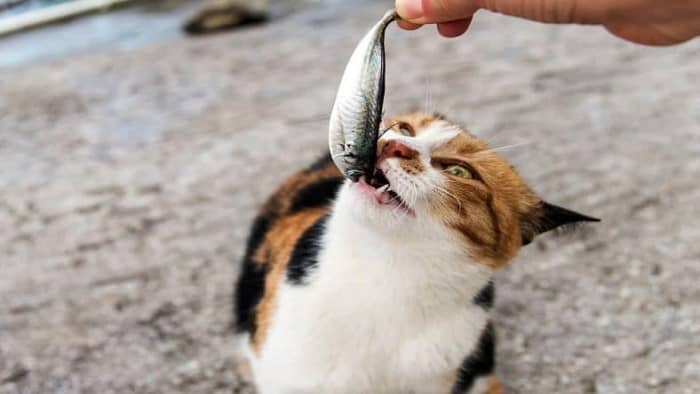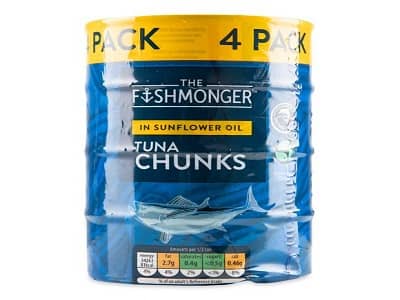Can cats eat tuna in sunflower oil? Cats can eat tuna in sunflower oil, however, it is important to understand the potential risks involved. Tuna in sunflower oil for cats contains high levels of omega-6 fatty acids if consumed in large quantities would result in unhealthy for cat’s health.

Additionally, canned tuna in sunflower oil for cats often contains additives and preservatives, which may also be bad for cats. It is important to check the label to make sure that no potential allergens or unhealthy ingredients are present and to feed cats only small amounts. This article will discuss the potential benefits and risks of feeding cats tuna in sunflower oil.
Overview Of Sunflower Oil
Sunflower oil is made from sunflower seeds and is high in linoleic acid, an essential fatty acid that cats need to stay healthy. It is also rich in vitamin E and other antioxidants that can help promote healthy skin and a glossy coat. Sunflower oil is a popular choice for cooking and baking, as it has a high smoke point. It is also often used as a base ingredient in salad dressings, sauces, dips, and marinades.
Benefits of Sunflower Oil for Cats
Sunflower oil is a common cooking oil that is made from sunflower seeds. It is a rich source of polyunsaturated fatty acids (PUFAs), including omega-6 fatty acids. These essential fatty acids play an important role in maintaining the health of your cat’s skin, coat, and immune system.
Here are some potential benefits of sunflower oil for cats:
- Skin And Coat Health: Sunflower oil contains essential fatty acids that can help improve your cat’s skin and coat health. These fatty acids can help to reduce inflammation, soothe dry skin, and prevent itching and flakiness.
- Immune System Support: PUFAs, such as omega-6 fatty acids, play an important role in supporting your cat’s immune system. This can help to reduce the risk of infections and other health problems.
- Digestive Health: Sunflower oil is also rich in vitamin E, which supports your cat’s food digestion process and also helps to reduce inflammation and protect your cat’s cells from damage.

However, it is important to note that if sunflower oil consumed in excess amounts can be harmful to cats, as it is high in calories and can leads to obesity. Additionally, cats are obligate carnivores and require a diet that is high in animal protein. So, it’s always best to consult with a veterinarian before adding any new foods or supplements to your cat’s diet.
Is It Safe for Cats to Eat Tuna in Sunflower Oil?
Can Cats Eat Tuna in Sunflower Oil? Tuna is a widely consumed food amongst cats that can be a beneficial addition to their diet if it is given in the right amounts. However, if the tuna is canned in sunflower oil, then it may not be the healthiest option for your furry feline friend to consume as this type of oil contains high levels of omega-6 fatty acids, which can cause inflammation and other negative side effects when eaten excessively.
Sunflower oil is a type of vegetable oil that is high in omega-6 fatty acids, which are already present in many of the ingredients used in commercial cat food. Feeding your cat too much omega-6 fatty acids can cause health problems which further leads to an imbalance of fatty acids.
Additionally, tuna that is canned in oil may contain excess salt, which can be harmful to your cat’s health. Cats require a low-sodium diet, and too much salt can lead to high blood pressure and other health problems.
If you want to feed your cat tuna, it’s best to choose canned tuna in water instead of oil. You can also offer your cat fresh or cooked tuna as a treat, but make sure to remove any bones and limit the amount you give them to avoid any potential health problems.

When it comes to your cat’s diet, it is always important and advisable to consult with your veterinarian before making any changes. This will ensure that they are receiving the proper nutrition needed in order to stay healthy and strong. Your vet can provide advice on what foods are best for your cat’s breed, age, weight, lifestyle and health issues. Additionally, they may advise you on supplements that may be necessary depending upon the situation. Ultimately, consulting with your veterinarian prior to changing your cat’s diet is essential for their overall well-being.
Potential Health Benefits:
- Protein: Tuna is a good source of protein, which is necessary for maintaining your cat’s muscle mass and supporting healthy growth and development.
- Omega-3 Fatty Acids: Tuna is also rich in omega-3 fatty acids, which can help to support your cat’s skin and coat health, reduce inflammation, and support brain function.
- Vitamin D: Tuna is a natural source of vitamin D, which is important for maintaining your cat’s bone health and supporting their immune system.
Potential Risks:
- Sunflower Oil: Sunflower oil is a type of vegetable oil that can be beneficial for your cat’s health, as it contains omega-6 fatty acids. Though these are essential, too much of them can cause an imbalance and lead to health problems. It should be noted that sunflower oil is high in calories and can contribute to weight gain if fed in excess, so it is important to feed this oil sparingly.
- Salt: Cats need to eat a low-sodium diet in demand to stay healthy. However, canned tuna that is packed in sunflower oil can contain too much salt and lead to high blood pressure and other health issues. It is important for cat owners to be mindful of the amount of sodium their pet consumes.
- Mercury: It is important to be cautious when feeding your cat tuna, as it can contain high levels of mercury which can be toxic if ingested in excess. To guarantee the safety and health of your cat, only feed them tuna in moderation and avoid making it a regular part of their diet.
If you’re looking to feed your cat tuna, it’s best to opt for canned tuna in water rather than oil. As an occasional treat, fresh or cooked tuna can be given – just make sure any bones are removed and limit the quantity to prevent potential health issues.
As always, it’s important to consult with your veterinarian before making any changes to your cat’s diet to ensure that they are getting all the nutrients they need to stay healthy.
Tips for Feeding Tuna to Cats
When feeding tuna to cats, it is important to make sure that it is fresh and packed in water or sunflower oil. Additionally, moderation should be maintained when giving cats tuna, and canned tuna with added salt and spices should be avoided. Cats should not be given any tuna that has been cooked in any type of oil or fat.
It is best to only feed cats tuna that is intended for cats. For the best health benefits, cats should be given tuna in sunflower oil as it is a healthier option than tuna in water. Sunflower oil provides cats with essential nutrients and fatty acids that are beneficial for their overall health.
Feeding cats tuna in sunflower oil can help improve their skin and coat health. To ensure their safety check is tuna in sunflower oil good for cats, it is recommended to rinse canned tuna before serving as this will reduce the amount of salt consumed which could potentially be harmful to cats’ health.
Rinsing Canned Tuna
Rinsing canned tuna for cats is easy – just put it in a colander and run cold water over it for a few minutes to remove any excess liquid. After washing, double-check the label of the can to make sure that there are no additives or preservatives which could be potentially harmful to your feline friends.

Canned tuna may contain high levels of sodium and mercury, so it is not recommended to feed it as a regular part of your cat’s diet. A healthier alternative would be fresh or cooked tuna, but even this should only be given in moderation and not as the primary source of nutrition for your cat.
Amount of Tuna to Feed to Cats
While tuna can be a healthy addition to your cat’s diet, it should be fed in moderation. A good rule of thumb is to limit tuna treats to no more than 10% of your cat’s diet. This means that if your cat eats 4 ounces of food per day, then tuna should be less than or up to 10% only.
We should also keep in mind that cats body needs different types of nutrition in comparison to human. Feeding them tuna which contains high quantity of sodium and mercury can further leads to imbalances and health problems. Always consult with your veterinarian before making any changes to your cat’s diet to ensure that they are getting all the nutrients they need to stay healthy.
Frequently Asked Questions
Q: Is tuna cooked in sunflower oil safe for cats to eat?
A: Cats can eat tuna in sunflower oil in small amounts, but it is not advised to feed on a regular basis as the oil contains high amount of omega-6 fatty acids, which can be unhealthy for cats if consumed in large quantities.
Q: Does canned tuna in sunflower oil contain additives or preservatives?
A: Yes, canned tuna in sunflower oil often contains additives and preservatives, which may also be harmful for cats health.
Q: What should I look out for when feeding cats tuna in sunflower oil?
A: When feeding cats tuna in sunflower oil, it is important to check the label to make sure that no potential allergens or unhealthy ingredients are present and to feed cats only in small amounts.
Conclusion
In conclusion, can cats have tuna in sunflower oil? cats can eat tuna in sunflower oil in small quantity, but it is not recommended on a regular basis as the oil contains high levels of omega-6 fatty acids, which can be unhealthy for cats if consumed in large quantities. Additionally, canned tuna in sunflower oil often contains additives and preservatives, which may also be bad for cats. It is important to check the label when feeding cats tuna in sunflower oil to make sure that no potential allergens or deleterious components are present and to feed cats only moderate amounts.
References:
1. Seafood Network Information Center. (n.d.). College of Agricultural Sciences. https://seafood.oregonstate.edu
2. Houpt, K. A., Essick, L. A., Shaw, E. B., Alo, D. K., Gilmartin, J. E., Gutenmann, W. H., Littman, C. B., & Lisk, D. J. (1988, January 1). Tuna fish diet influences cat behavior. [Elevated levels of selenium and mercury in commercial tuna fish cat food]. https://www.osti.gov/biblio/7090402
3. Coates, J. D. (2018, March 19). Of Cats and Fish. https://www.petmd.com/blogs/nutritionnuggets/cat/jcoates/2013/july/is-fish-bad-for-cats-30648

Brenda Castillo is a volunteer groomer of a local pet welfare group in New York and a regular contributor to CatLikesBest. She likes to read & write about cat grooming. She also guardians two chubby tabbies, Belly & Puma.




